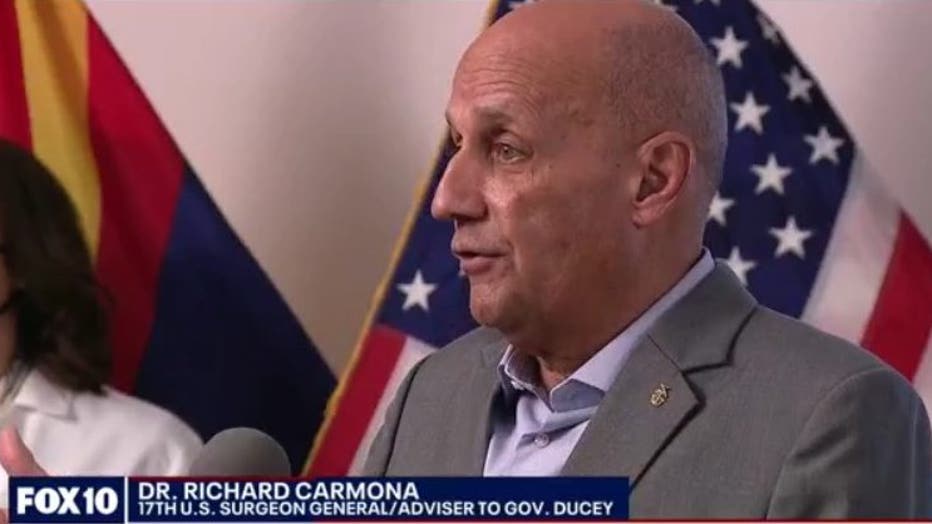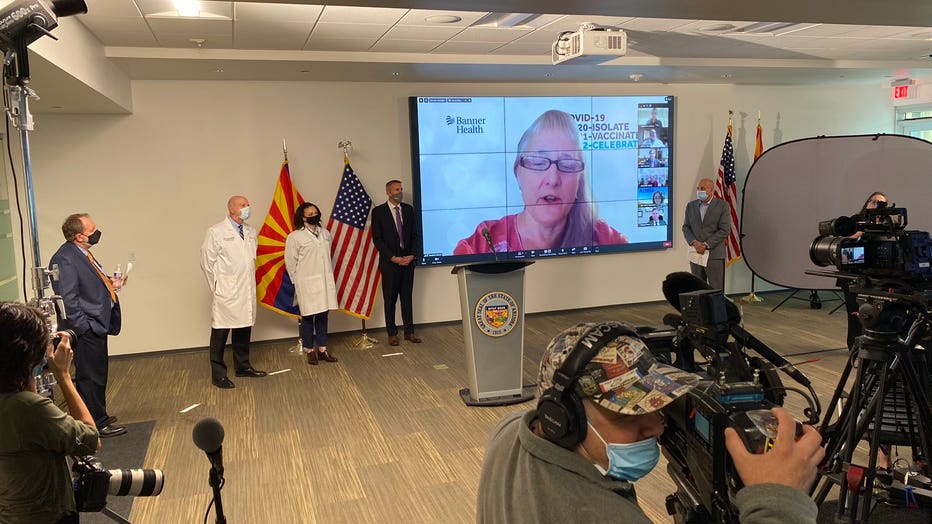Arizona officials hold COVID-19 briefing on hospital capacity

Arizona officials hold COVID-19 briefing as hospitals near capacity
Gov. Doug Ducey’s COVID-19 adviser and hospital leaders held a briefing as hospital capacities are reaching their limits in Arizona.
PHOENIX - Arizona on Nov. 23 reported over 3,000 additional confirmed COVID-19 cases and 120 more deaths amid growing concern about the pandemic’s current surge and its impact on the state’s hospital system.
Gov. Doug Ducey’s COVID-19 adviser and hospital leaders held a briefing Tuesday afternoon on "how Arizonans can help preserve hospital capacity during the holiday season."
Virus-related hospitalizations continue to climb, with 2,551 COVID-19 patients occupying inpatient rooms as of Monday. That’s about half the number of virus hospitalizations during the peak of last winter’s surge but currently, there is little available capacity statewide because many hospitals are also caring for large numbers of non-COVID patients.
"We also are treating those COVID patients that are having long stays in our ICU, and they’re preventing us from taking care of all of the other patients," said Dr. Alyssa Chapital, Hospital Medical Director for Mayo Clinic in Arizona.
"If COVID wasn’t here, we could manage because every year at this time, we see a surge. Usually, we’re able to accommodate that, but now, it's much more difficult because COVID is taking up much of our beds," said Dr. Richard Carmona, the 17th U.S. Surgeon General and an advisor to Governor Doug Ducey.
Dr. Carmona said the vast majority of COVID patients are not vaccinated, and he had a stern message for those who choose to not get vaccinated.

"We're asking everybody to do their part," said Banner Health Chief Clinical Officer Dr. Marjorie Bessell. "Our nurses are tired. Our physicians are tired. Yet, they all want to do their best to be there for you."
Meanwhile, the additional 3,057 cases and 120 deaths reported Tuesday increased the state’s pandemic totals to 1,248,184 cases and 22,062 deaths, according to the state’s coronavirus dashboard.
However, the case report was lower than it otherwise would be "due to a reporting issue with one provider," the Department of Health Services said on Twitter. "We expect tomorrow’s cases added to be higher as a result."

Arizona health officials hold a news conference on Nov. 23 on "how Arizonans can help preserve hospital capacity during the holiday season."
Arizona’s seven-day rolling average of daily new cases in Arizona was just under 4,000 as of Sunday, up from just over 3,000 two weeks earlier, according to Johns Hopkins University data.
Meanwhile, the rolling average of daily deaths rose from 36.3 to 41.3 during the same period. The daily deaths report fluctuates dramatically, often spiking after low numbers early in the week due to weekend reporting delays.
MORE: Coronavirus in Arizona: Latest case numbers
In order to protect yourself from a possible infection, the CDC recommends:
- Avoid close contact with people who are sick.
- Avoid touching your eyes, nose, and mouth.
- Stay home when you are sick.
- Cover your cough or sneeze with a tissue, then throw the tissue in the trash.
- Clean and disinfect frequently touched objects and surfaces using a regular household cleaning spray or wipe.
- Cover your mouth and nose with a cloth face cover when around others
- Wash your hands often with soap and water for at least 20 seconds, especially after going to the bathroom; before eating; and after blowing your nose, coughing, or sneezing.
- Monitor your health daily
Symptoms for coronavirus COVID-19 include fever, coughing, and shortness of breath. These, of course, are similar to the common cold and flu.
Expect a common cold to start out with a sore or scratchy throat, cough, runny and/or stuffy nose. Flu symptoms are more intense and usually come on suddenly, and can include a high fever.
Symptoms of COVID-19 may appear more slowly. They usually include fever, a dry cough and noticeable shortness of breath, according to the World Health Organization. A minority of cases develop pneumonia, and the disease is especially worrisome for the elderly and those with other medical problems such as high blood pressure, obesity, diabetes or heart conditions.
RELATED: Is it the flu, a cold or COVID-19? Different viruses present similar symptoms
To protect yourself, wash your hands well and often, keep them away from your face, and avoid crowds and standing close to people.
And if you do find yourself showing any of these flu or coronavirus symptoms - don't go straight to your doctor's office. That just risks making more people sick, officials urge. Call ahead, and ask if you need to be seen and where.
More COVID-19 in Arizona news
- Arizona man reunited with family after months-long COVID-19 battle
- With COVID numbers rising, Arizona urges holiday precautions
- Judge hears argument in Arizona attorney general's lawsuit over federal COVID-19 vaccine rules
Tune in to FOX 10 Phoenix for the latest news:

